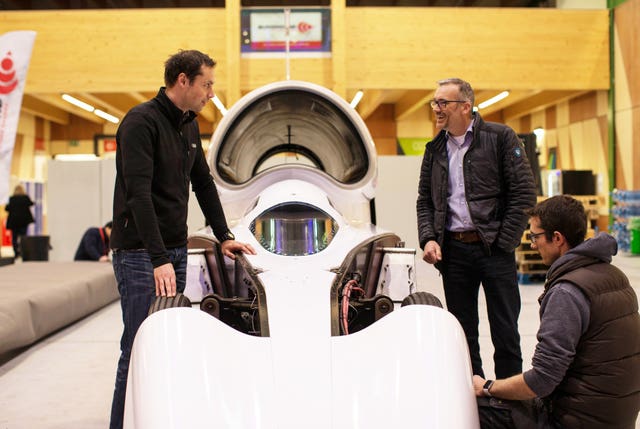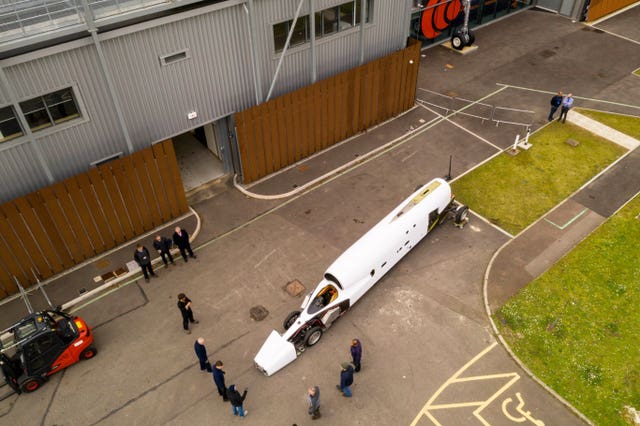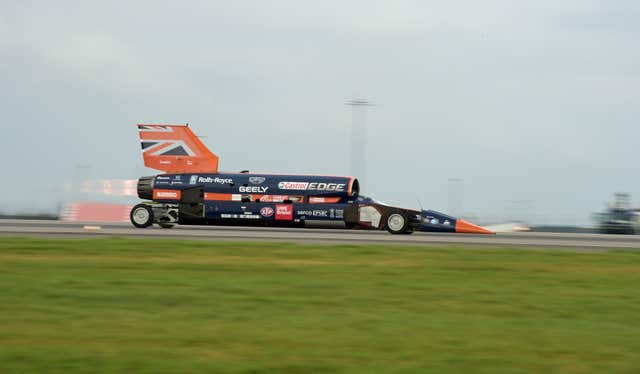The Bloodhound supersonic car is back in pursuit of the world land speed record after being saved from the scrapheap at the last minute.
Ian Warhurst, a Yorkshire-based entrepreneur, stepped in after receiving a text message from his son telling him the project had collapsed.
Bloodhound Programme Ltd, the firm behind the initiative to hit speeds of 1,000mph, went into administration in October.

In December, it announced that no investors could be found to take the project forward – with plans to return equipment and sell the remaining assets.
At a relaunch of Bloodhound on Thursday, Mr Warhurst said: “My eldest lad Charlie sent me a text on the Friday night when he heard the news that it was going to get broken up, saying ‘Hey Dad, why don’t you buy the car hahaha’ because he knew I probably could actually.
“When I looked into it and realised it was being broken up I thought ‘I need to save that’.
“So I came to visit the administrators. If I’d have left that building and not done something to stop it, at that point it was going in the skip.

“The sense of responsibility was there, that I just couldn’t let that happen.
“I like to think that anyone in my position would have done the same thing. You couldn’t see something with so much effort gone into it just stop.”
Mr Warhurst said there had been a “national outpouring of goodwill” for Bloodhound.
He described how he had been a fan of Thrust SSC, which set the world land speed record of 763.035mph with driver Andy Green in 1997.
“It was amazing when they broke the sound barrier,” Mr Warhurst said.
Here’s @Bloodhound_LSR in her new home with new livery and a new logo. Focus here is completing development of the jet and rocket powered car for high-speed tests #BloodhoundLSR pic.twitter.com/z9XV63Yoxh
— Claire Hayhurst (@clairehayhurst) March 21, 2019
He described taking his children to Birmingham’s NEC to see a Bloodhound event, where they spent the day building rocket cars.
“Bloodhound over the past 10 years has been so inspirational for kids,” he added.
Bloodhound’s new home is SGS Berkeley Green University Technical College (UTC) on the Gloucestershire Science and Technology Park.
Students at the college visited the 975 square metre workshop on Thursday to view the car, excitedly posing for pictures next to it.
Since December, there has been a complete rebranding of the programme, now named Bloodhound Land Speed Record (LSR).
Revitalised #Bloodhound LSR gets new livery and headquarters #video Get the full story: https://t.co/e6dLyVM4LH pic.twitter.com/HOPvG32jh8
— Bloodhound LSR (@Bloodhound_LSR) March 21, 2019
The newly assembled team will focus on completing development of the jet and rocket-powered car and moving to the next phase of high-speed testing as soon as possible.
Bloodhound’s blue and orange livery has been replaced with red and white, though this could change with sponsorship in the future.
Mr Warhurst and the team spent a number of months assessing whether the car should be put in a museum or continue aiming for the world land speed record.
“We came to the conclusion that this was a perfectly commercially viable project so therefore we should run the car – that’s what it was supposed to do,” he said.

“After 10 years of blood, sweat and tears, this car deserves to be put on the desert and run as fast as we can.
“I’m going to cashflow the project so it can get on with doing what it needs to do and not concentrate on the start and stop all the time with sponsorship, waiting for money to come in.”
Current world land speed record holder Andy Green will continue to be the driver of the car.
Many of Bloodhound’s original mechanics and technicians will also work on the project.
Dates for the high-speed test runs and the world land speed record runs will be announced once operational and logistics planning is finished.
Mr Green said: “We are thrilled that Ian Warhurst has taken on the challenge of Bloodhound, to promote UK engineering on a global stage, to create a science and technology adventure for the YouTube generation and simply – as he put it so accurately himself – to let Bloodhound off its leash and find out just how far it can go.
“The great news is we are now going to get this car running as soon as we can.”
Mr Green said Bloodhound, which was founded in 2007, would go to the specially-built race track at Hakskeen Pan in the deserts of the Northern Cape of South Africa for testing.
The target is to first break the world land speed record of 763.035mph before aiming for the maximum design speed of around 1,000mph.
